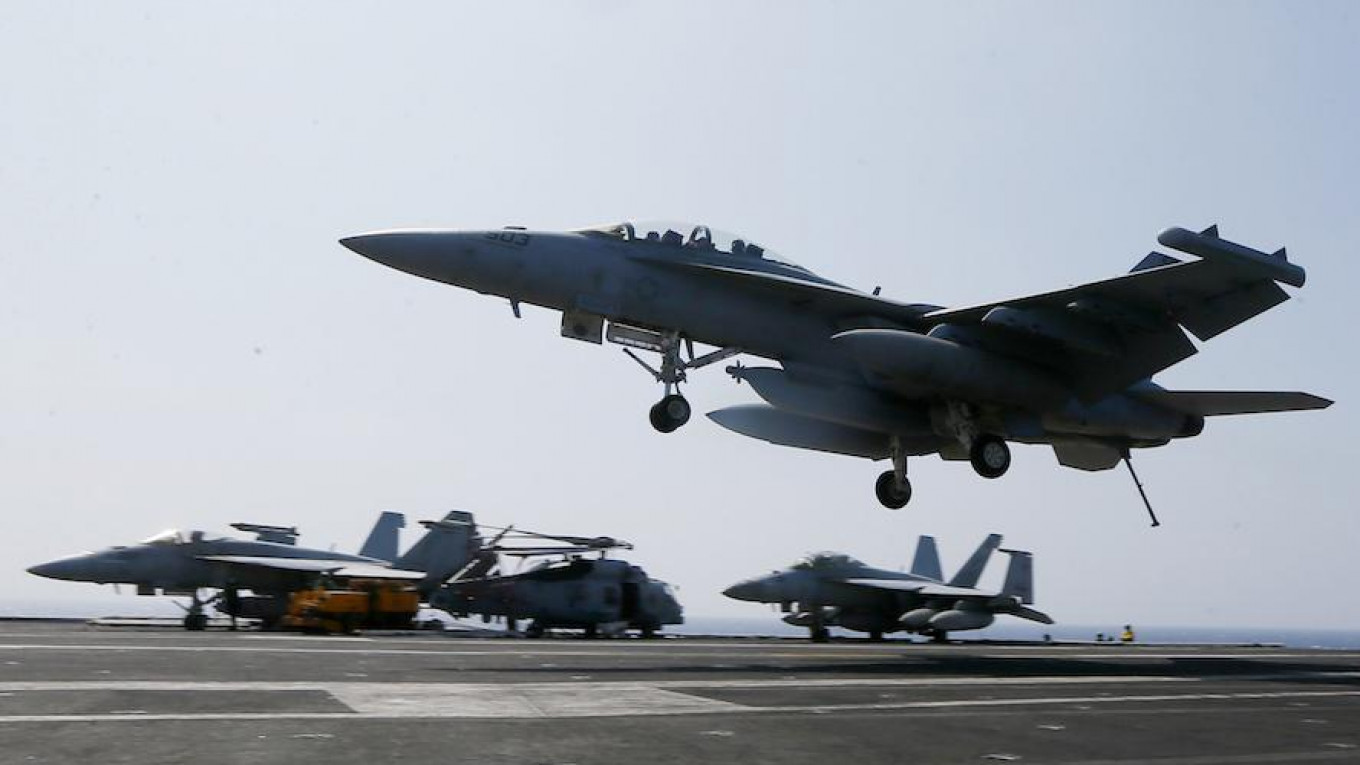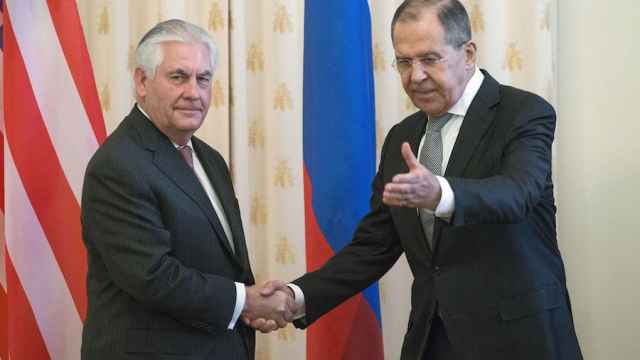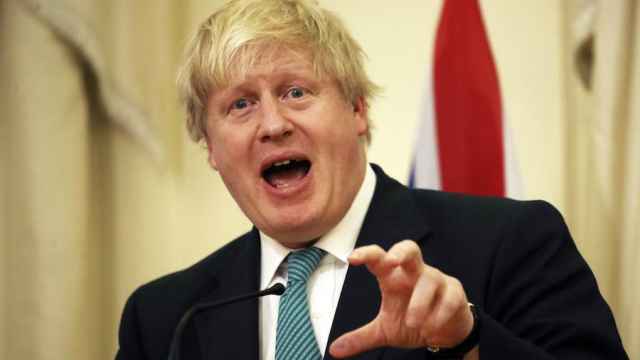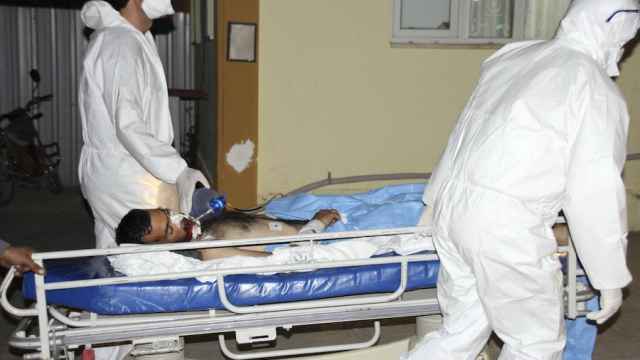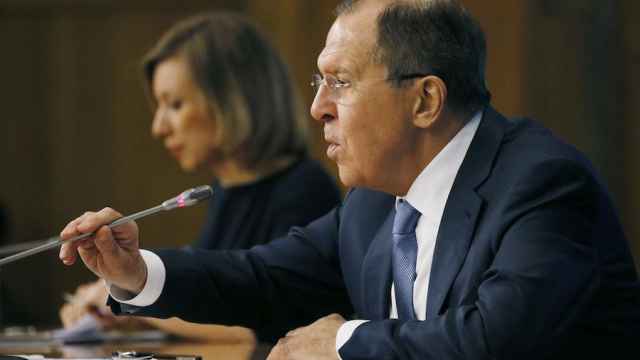In response to U.S. President Donald Trump’s strike on an airbase controlled by Syrian President Bashar Assad early Friday morning, the Russian Foreign Ministry announced the suspension of an airspace safety agreement with the U.S. and its allies. The move heightened the drama surrounding Trump’s bold attack, but changes little about the situation in Syria.
Russia acted swiftly in its condemnation of the attack. The Kremlin declared the strike was a “violation of international law” and an “act of aggression against a sovereign nation.” The real motive, according to Kremlin spokesman Dmitry Peskov, was to draw attention away from civilian casualties in Iraq. Russia is now calling for a UN security council meeting to talk it over.
The suspension of the deal on airspace safety in Syria has so far been the most concrete Russian response.
The agreement, hashed out just over two weeks after Russia’s surprise September 2015 intervention in the Syrian civil war, has always been nothing more than a token gesture, says Andrei Frolov, editor-in-chief of the Moscow Defense Brief, an annual publication from the Center for the Analysis of Strategies and Technologies (CAST) think tank.
The document has had little to no impact on the way the Russian and United States air forces operate in the conflict. Both organizations already have measures in place to ensure they can operate safely in proximity to other nations’ air forces. “Abandoning the memorandum, at least for now, was a way for Russia to save face,” he says.
A Piece of Paper
The U.S.-led coalition against the Islamic State in Syria (ISIS) and Russia’s campaign to support Assad’s beleaguered ground forces have generally operated in different areas of the country. The majority of Russian air-strikes are focused on the country’s western provinces, while U.S. airstrikes generally fall east.
However, there are areas where operations overlap, and there professionalism on both sides is important.
The memorandum simply provided a formal outline for a prearranged framework through which incidents could be worked through. The main provisions of the document were the establishment of a 24-hour-a-day hotline between Russian and American command centers in Syria. It also established a means to coordinate rescue operations for downed pilots.
One of the main purposes for the agreement was political. The United States and Russia had diametrically opposed goals in Syria in October 2015. Both sides appeared to think they could somehow rhetorically strongarm the other into abandoning their aims, and joining forces. They were left disappointed. In the end, the United States pursued its goals, while Russia pursued its own.
A Bridge Too Far
The Russian and American responses to Assad’s alleged sarin gas attack on Syrian civilians this week reflects that basic divide remains. While Russia insisted the gas was released after a strike on a terrorist chemical weapons storage site, Washington insisted the gas was dropped by Assad’s air force.
Trump’s response was dramatic: launch 59 Tomahawk cruise missiles at the base the planes allegedly operated from.
For the moment, the situation shows little indication of spiraling out of control. Washington notified Russia of its intended attack, giving Russian personnel (and their Syrian allies) a chance to move out of the way. As military and security expert Mark Galeotti noted on his blog Friday, Russia did not attempt to stop the attack by activating its capable air defense systems in Syria.
“Moscow might not like Washington’s response, but nor was it willing to stand in the way of it,” Galeotti wrote. “That is a heartening sign of realism.”
Indeed, the Kremlin’s response is likely to remain in the realm of the symbolic, at least for now. Abandoning the airspace safety agreement was one such response. It has a few other options.
“I don’t think we are on the brink of war, but there may be snap exercises carried out, including nuclear forces exercises,” Frolov says. “But I think Russia’s reaction will be a swift action against the forces of extremist group Al-Nusra and, possibly, a buildup of additional air defense systems around Russian bases in Syria.”
Honeymoon Over, Again
This reflects the general state of affairs of the past two years. Ultimately, nothing has changed in Syria. Even Trump’s cruise missile strike, impressive in volume, does not appear to have done significant damage to the ability of Assad’s airforce to bomb things, according to an analysis released by IHS Jane’s analyst Reed Foster on Friday.
“The Shayrat air base has traditionally been home to air defense and attack aircraft [...] that would potentially deliver chemical weapons such as sarin,” Foster was quoted as saying. “Although the strike will weaken the [Syrian air force], it will not significantly diminish the ability of the Assad regime to conduct further chemical weapons attacks.”
Ultimately, the only thing that Trump’s strike appears to have changed is Russia’s internal expectations for a detente with the United States.
Margarita Simonyan, the editor-in-chief of state-run news agency RT (formerly Russia Today), famously tweeted following Trump’s victory that she was driving around Moscow with an American flag on her car.
After the strike, she had only this to say: "We had a chance [at friendship]. It was f**ked up. But not by us."
Al-Nusra is a terrorist organization banned in Russia.
A Message from The Moscow Times:
Dear readers,
We are facing unprecedented challenges. Russia's Prosecutor General's Office has designated The Moscow Times as an "undesirable" organization, criminalizing our work and putting our staff at risk of prosecution. This follows our earlier unjust labeling as a "foreign agent."
These actions are direct attempts to silence independent journalism in Russia. The authorities claim our work "discredits the decisions of the Russian leadership." We see things differently: we strive to provide accurate, unbiased reporting on Russia.
We, the journalists of The Moscow Times, refuse to be silenced. But to continue our work, we need your help.
Your support, no matter how small, makes a world of difference. If you can, please support us monthly starting from just $2. It's quick to set up, and every contribution makes a significant impact.
By supporting The Moscow Times, you're defending open, independent journalism in the face of repression. Thank you for standing with us.
Remind me later.


